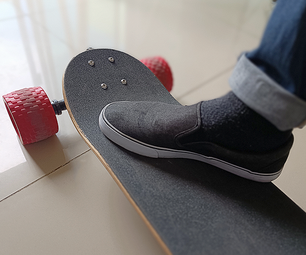Introduction: 1" Air-canon QEV
Ok let's make it clear: it's just the canon part. The reservoir & valve -wich is a blow-off ( aka blast-off, quick-exhaust) are'nt built yet, that's another story, I'll make another instructable then but for now...
If I have'nt build a thousand of air-powered guns over the last 20 years or so.. But only a few made it to completion, for I have way much more fun to "puzzle-built" than using, so the final result usually stay dissasembled in a box and I steal them parts.. Anyways sometime I think the results are worth completing so here's a .12 gauge pump-action inspired gun, all aluminium and made with simplicity, minimalism and "this piece would look bad-@ss" in mind.
This instructable is mostly to suggest an idea and explore what might pop-up from who would like to comment or suggest so hit me plenty, my life is a perpetual brain-storming.
Step 1: Parts
Every parts has been carefully selected with the same technique I described earlier: "this would look nice... How can it be used to go there .. can it handle the forces/job... etc..." Therefore I'm not going to give much measurements, it's pretty much irrevelant. As for the bolt, I added a plastic tube to shim over the alum. inner-sleeve, I did'nt had the right alum. pipe size in stock but I think it's better this way because it reduces friction & "hard-sliding" due to dust and "stuff"... Just look at the picture, I made a list because I thought it looked more serious.... as serious as can be...
One piece of cantruss ("real" DIY'ers won't feel the need to google it ;) )
One 1" (inside diameter) pipe (lenght was dictated by what I had in stock)
One U-channel
Four bearings (salvaged from dead hard-drives)
One lenght -3 to 4 inches- of 1" (outside diameter) "sorft" plastic tubing. It's the plastic container of a KLEIN glass-fiber fish-tape, it's the same plastic pop-bottles are made from, this pipe is about a 1/32"/0.5mm/kinda/looks like it.. wall thickness.
One lenght -2 to 3 inches- of alum. tubing that fits inside the plastic tubing. From a snow-broom for cars.
One small spring, a couple piece of lexan cut-outs from previous projects, cutted down, "dremelled" and drilled as much as requested, some screws, washers and finally, a piece of polycarbonate (plexyglass, lexan, etc..) for the front bracket around the canon.
Step 2: Do the Barrel and the Bolt First.
Drill, dremel, file, re-dremel, hack-saw, re-file, sand-paper, dremel again..
Then you should end with a soon-to-be-called canon.
The bolt itself is pretty simple, reffer to the picture for any questions... BTW, it's long enough to cover the reload hole and the slot for the guide-pin when in "fire" position.
Step 3: The Bracket/thing-part With Bearings
The fun part..
First, check measurements, fit & other time-consuming things and fit the bearings on the u-channel with a threaded hole then a counter-nut. How to adjust? Remember these two holes on the cantrus? Duct-tape the cantruss to the canon and check how the channel fits, mark holes, re-check, wiggle the thing, try other options, get mad, scrap some pieces and then, assemble as described. I used a piece of paper to shim during adjustment, giving it some freeplay when assembled.
Now for the "buggy", I ..simply.. -yeah, simply my a.. Anyways, It took me some dremel artwork to shape the top just as round as the canon. There is a "seating hole" for the pin of the barrel to.. sit in. Another hole for the return spring, and finally a hole forn side to side for the retaining screw. I had to cut two corners because the lock-nuts of the bearings were in the way.
Step 4: Joining the Canon/pumping Mechanism
Simply seat the barrel's pin in the "buggy" and place the front bracket made of thermoformed acrylic. The making and process of the "collar" is'nt shown because it was a real motherf.. pain in a goat's @ss.. Only thing you should remember: don't think making such piece is a good option. But I wanted it for the look, nothing more.
2nd picture is the result at rest/fire position.
The 3rd picture shows the reloading position.
Step 5: Comments, Pros, Cons, Suggestions.. Questions...
Oh, last detail: the other end of the "bracket" will be held in place on the end-cap of the to-be-done reservoir. Until then, duct-tape does magic.
I hope this was usefull or it has gave you some ideas..
Step 6: Extra Bracket Fix..
I plan to use a 3" (I.D.) 6061 alum. pipe for the air tank (the same material used for the canon) and plug the ends with a 3/4" thick by 3" diam. puck of lexan, with two rubber o-rings. Four or five screws sideways will hold them in place. The tank will be on the same "axis" as the canon for I plan on making a QEV at the very end of the canon, wich will be inside the tank... Get it? I'll update this instructable, promise.
The bracket back-end was to be held on that lexan plug without any visible screw or extra bracket/part/etc.. because I try to avoid seing screws. But I'm wondering if the front-end will get lose over time with the back and forth movement. With the original concept, both ends get an excellent support to keep the bracket against the canon, but nothing seems really efficient against the longituidal forces from repetitive pumping. This would really suck if it slides..
So here's how I got it secured without more than one visible screw.
I dremeled another spacer out of lexan and to get a very good fit, I held the u-channel and the spacer against the canon near the end with a clamp and heated inside the canon with a little butane torch just enough for the spacer to take the shape, making shure to tighten the clamp slowly as it took shape. I kinda over-worked it so it ended with some freeplay between the u-channel, so I simply added a washer. See pictures for more info.
The screw does'nt reach inside the canon, it would be in the way of the bolt raceway.
Step 7: Air Valve for Reload
There it goes.
I wanted the reservoir to be filled when the "pump" handle is on the reload position. It had to stop the intake line and also keep the air to come back from the reservoir. It's made to fin inside the reloading-handle but I'm not sure where I'll put it.. (comments/suggestions, please..)
It's made from a block of 3/4" thick lexan. A modified shraeder valve is to be actuated by a push-rod. The push-rod itself is made from a broken Dremel accessory. It's nothing more than a shaft with a flat head, like a nail, to give and idea.. The flat-head part is important to avoïd the rod being pushed-out from the air pressure. It seats on a O-ring. There is also another seal at the other end, another O-ring and a nylon washer. I grooved the rod to get a snap-ring in order to hold a spring, wich keeps the rod in the "closed" position and also helps to seal das thingy..
The inlet valve was a little bit tricky to figure, it has to stop the incoming flow from the air feed. The push-rod is -technically- supposed to keep a good seal while refilling, no air should leak from it's hole. It should. Technically. ..I hope so., basically.
So when the push-rod is actuated, it pushes on the shraeder valve and the air is allowed to go. It's only way out is by pushing the rubber ball, then to the reservoir. A small spring holds the ball always closed, but it's far from being able to stop the air.
Now my next step is installing it on the canon, but I don't know if I want it to be visible or hiden under the pump-handle... With two plastic air-lines to be installed under the almost done (tell me about "almost done"..) reservoir, running on either sides of the unexisting handle, one line will be from the air-supply and the other feeding the reservoir by it's back-end, because of the quick-exhaust valve.
The reservoir is almost done, the Q.E. valve is also done but it's a little too early in the process to upload about it as for now..













